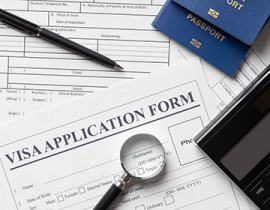- Home
- Blog
- Legislation
- Spain's New Immigration Law: What You Need to Know?
Spain's New Immigration Law: What You Need to Know?
.jpg) Spain has a new immigration law for foreign nationals! This new legislative framework introduces some changes that affect non-EU nationals, students, and families of Spanish citizens. Below, you will explore the main aspects of the new immigration law in Spain, what it means for potential immigrants, and how it fits into broader immigration reform in Spain.
Spain has a new immigration law for foreign nationals! This new legislative framework introduces some changes that affect non-EU nationals, students, and families of Spanish citizens. Below, you will explore the main aspects of the new immigration law in Spain, what it means for potential immigrants, and how it fits into broader immigration reform in Spain.
The new Spanish immigration laws represent a major shift in policy and practice. The updated regulations reflect Spain's commitment to social inclusion and economic dynamism, emphasizing regularization and integration over exclusion!
One of the aspects of the new immigration law in Spain is the expansion and redefinition of the "arraigo" program. Traditionally, this program allowed individuals who had lived in Spain for a certain period without legal status to apply for residency based on social or employment ties. Under the new system, the requirements have been restructured to allow more flexibility and better alignment with current economic needs. For instance, individuals who can demonstrate a consistent work history, even informally, may now qualify for legal status through a regularization process for migrants in Spain.
New Residence Permits and TIE Requirements
Another highlight of the new legislation is the introduction of new types of residence permits. For example, a new residence permit in Spain is now available for family members of Spanish citizens, simplifying what was previously a bureaucratic and often prolonged ordeal. The new law enhances the ability of Spanish citizens to reunify with their family members from non-EU countries.
In addition, changes to the TIE (Tarjeta de Identidad de Extranjero) process are central to the updated framework. The TIE Spain requirements have been clarified to make the application process more transparent. Applicants wondering how to get TIE in Spain will find a more streamlined and accessible system. The TIE application process has been digitalized in many areas, and authorities have issued detailed guidance on documents needed for TIE Spain applications.
For those planning to move to Spain, understanding how to get a TIE in Spain is crucial. The TIE card Spain is the official document that proves a foreign national's legal status. Whether you're a student, a worker, or a family member of a Spanish citizen, you'll need to apply for TIE Spain shortly after arriving. The process now includes clearer documentation requirements, faster turnaround times, and improved support services for applicants.
One of the most practical benefits of the new system is its embrace of digital tools. The process to apply for TIE Spain, as well as other immigration procedures, is increasingly conducted online, reducing bureaucratic delays and improving accessibility. Government portals now offer comprehensive resources, including checklists of required documents needed for TIE Spain, step-by-step instructions, and customer support in multiple languages. Even though important applications like TIE are becoming digital, it's essential to get expert guidance during the process. Don’t forget that professional advice can help avoid mistakes and ensure a smooth application!
Family Reunification and Support for Spanish Citizens
The updated Spain laws on immigration make it significantly easier for Spanish citizens to bring their non-EU family members into the country. A family residence permit in Spain is now easier to obtain, with less stringent income thresholds and a faster processing time. This is a particularly welcomed change for many mixed-nationality families who faced numerous hurdles under the previous legal framework.
.jpg) The immigration law in Spanish includes specific clauses that outline the eligibility and process for applying for family-based residence permits. These changes not only foster family unity but also reflect Spain's dedication to human rights and family integrity.
The immigration law in Spanish includes specific clauses that outline the eligibility and process for applying for family-based residence permits. These changes not only foster family unity but also reflect Spain's dedication to human rights and family integrity.
Improved Pathways for Students and Workers
The benefits of the new immigration law in Spain are especially evident in its provisions for international students. The legislation has streamlined the procedures for switching from student visas to work permits, allowing students to transition more easily into the labor market. This approach addresses both the needs of the Spanish economy and the aspirations of young, skilled migrants.
Furthermore, the new law outlines immigration rules for non-EU nationals in Spain, offering new opportunities for legal employment and social integration. The reformed framework supports legal migration channels, which are crucial for tackling labor shortages in key sectors like agriculture, healthcare, and technology.
Addressing Irregular Status
A major highlight of the immigration reform Spain has undertaken is the inclusive approach toward individuals in irregular status. Rather than focusing on punitive measures, the new Spanish immigration laws provide avenues for regularization and social inclusion. The new arraigo categories are more accommodating and realistic, taking into account the economic and social contributions of migrants.
The Spanish government has emphasized that the goal is not just to control immigration but to create pathways for meaningful participation in Spanish society. This is a marked departure from previous approaches that often left long-term residents in limbo.
What Does This Mean for Future Migrants?
For those considering entry into Spain, the new immigration law represents a more welcoming and structured environment. Whether you’re seeking a family residence permit Spain, looking to join the labor market, or simply exploring how to get a TIE in Spain, the process is now more navigable and equitable.
Moreover, the reforms reflect a broader shift in how Spain views immigration: not as a problem to manage, but as an opportunity to harness. The benefits of the new immigration law in Spain are clear in its focus on integration, regularization, and human rights.
Spain's new immigration law is a bold step toward a more inclusive and efficient system. With provisions that simplify the TIE Spain process, create new residence permits, and support the regularization of undocumented individuals, this legislation marks a pivotal moment in Spanish immigration policy. As the country continues to adapt to demographic and economic challenges, these new Spanish immigration laws set a precedent for thoughtful, forward-looking immigration reform in Europe.
In summary:
New Spanish Immigration Law – Key Changes
.jpg) 1. Education
1. Education
- Longer Student Permits: Students will now receive permits valid for their entire course, removing the need for yearly renewals.
- Easier Transition to Work: Graduates can immediately apply for work permits, allowing them to start jobs right after finishing their studies.
- Clearer Rules for Eligibility: There is more legal clarity about which types of studies and institutions qualify for permits.
2. Work
- Simpler Hiring Process: Employers will face less bureaucracy and have clearer rules when hiring foreign workers.
- Better Protection for Seasonal Workers: Seasonal employees will have improved legal safeguards and a smoother hiring process.
3. Family
- Simplified Family Reunification: It will be easier to bring family members to Spain, with more flexible financial support requirements.
- New Rights for Relatives of Spanish Citizens: A new legal framework offers better protections and easier immigration procedures for family members of Spanish nationals.
Foreign nationals, especially those from non-EU countries, now have a clearer path to legal status, work opportunities, and family reunification. For anyone planning to work and stay in Spain, understanding the TIE for Spain and the steps to apply for TIE Spain is now easier than ever. The changes not only benefit individuals but also serve the broader interests of Spanish society by fostering a more cohesive and dynamic population.








